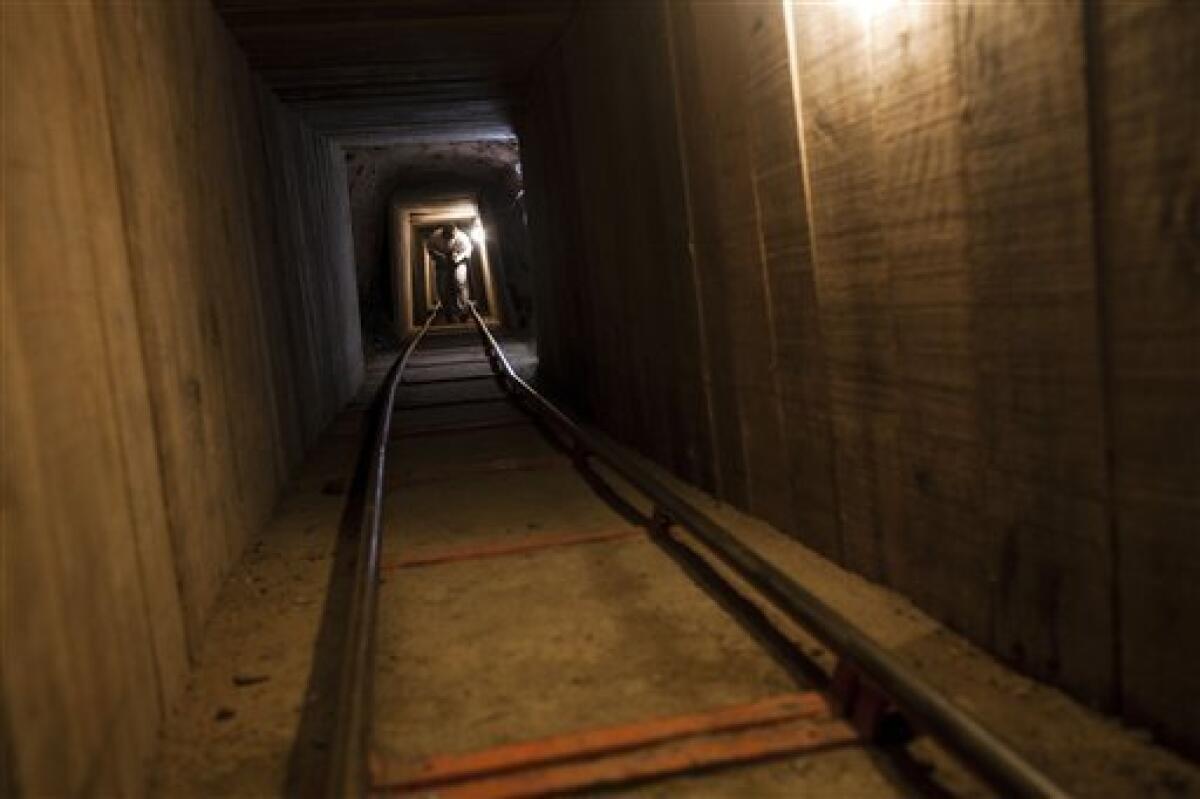‘El Chapo’s’ reputed tunnel builder extradited to San Diego

Jose Sanchez Villalobos is facing a 13-count indictment after being imprisoned in Mexico for eight years.
- Share via
SAN DIEGO — The reputed architect of some of the Sinaloa drug cartel’s most elaborate tunnel systems has been quietly extradited to San Diego, eight years after his arrest in Mexico.
Jose Sanchez Villalobos, 58, is alleged to have been the highest-ranking cartel member tasked with building cross-border tunnels and using them to smuggle large amounts of marijuana into the United States when he was indicted in 2012, according to court documents filed in San Diego federal court.
As with other recent extraditions of high-level cartel suspects, his happened with little fanfare.
He was transferred to U.S. agents at an airport in Toluca, Mexico, on Jan. 10 and taken to San Diego. He was arraigned three days later on a 13-count indictment. A plea of not guilty was entered on his behalf.
Mexico’s federal prosecutorial agency announced the extradition on Sunday.
Sanchez’s arrest in 2012 came during a flurry of tunnel construction along San Diego’s border with Mexico — particularly in the Otay Mesa commercial district, where warehouses provided ample cover for trafficking activity and the area’s soil composition made for ideal building conditions.
The tunnel-building campaign — and the effort to push the engineering boundaries — came under the leadership of Sinaloa drug lord Joaquin “El Chapo” Guzman, long known for favoring subterranean routes.
While dozens of tunnels have been found in California over the last couple of decades, the indictment charges Sanchez with helping finance and construct two.
One was discovered on Nov. 25, 2010. It started in the dining area of a Tijuana home and ran for 2,200 feet, coming out at two Otay Mesa warehouses. The discovery led to the seizure of 22 tons of marijuana — most of it found in a tractor-trailer stopped at a Border Patrol checkpoint and some of it from inside the tunnel and at a ranch in Mexico.
The construction was sophisticated, with a rail system, tongue-and-groove flooring and ventilation, authorities said at the time.
The second tunnel was raided a year later, running 40 feet underground with an electric rail system and elevator. It originated in a Tijuana warehouse and emptied into an Otay Mesa warehouse. The investigation resulted in 32 tons of marijuana seized.
At the time, the U.S. Drug Enforcement Administration called it “the most elaborate smuggling tunnel uncovered along the U.S.-Mexico border in recent years.”
U.S. authorities described Sanchez as a regional manager for the Sinaloa cartel in the states of Baja California and Jalisco, overseeing the movement of marijuana from southern Mexico to northern Mexico, where it was stored in stash houses before its journey into the United States.
Sanchez not only managed the construction of the tunnels, but he also determined who was able to smuggle marijuana through them and charged fees to drug traffickers for the privilege of using the passageways, authorities said.
He was arrested in January 2012 in Mexico and spent the next eight years in extradition proceedings. The effort to bring him to the U.S. was held up in part by “a really serious medical issue,” his defense attorney, Guadalupe Valencia, said Tuesday. Sanchez’s health remains a concern now, the attorney said.
In the time between his indictment and extradition, the political, cultural and legal landscape surrounding marijuana has shifted. It is now legal in California but remains an illicit substance under federal law. Even so, bulk marijuana smuggling cases are rarely prosecuted at the federal level, with the focus now on fentanyl, methamphetamine and cocaine coming across the border.
Sanchez doesn’t have ties to San Diego, but he had lived in the U.S. for many years previously, at one point obtaining legal permanent residency for agricultural work, Valencia said.
Davis writes for the San Diego Union-Tribune.
More to Read
Sign up for Essential California
The most important California stories and recommendations in your inbox every morning.
You may occasionally receive promotional content from the Los Angeles Times.














